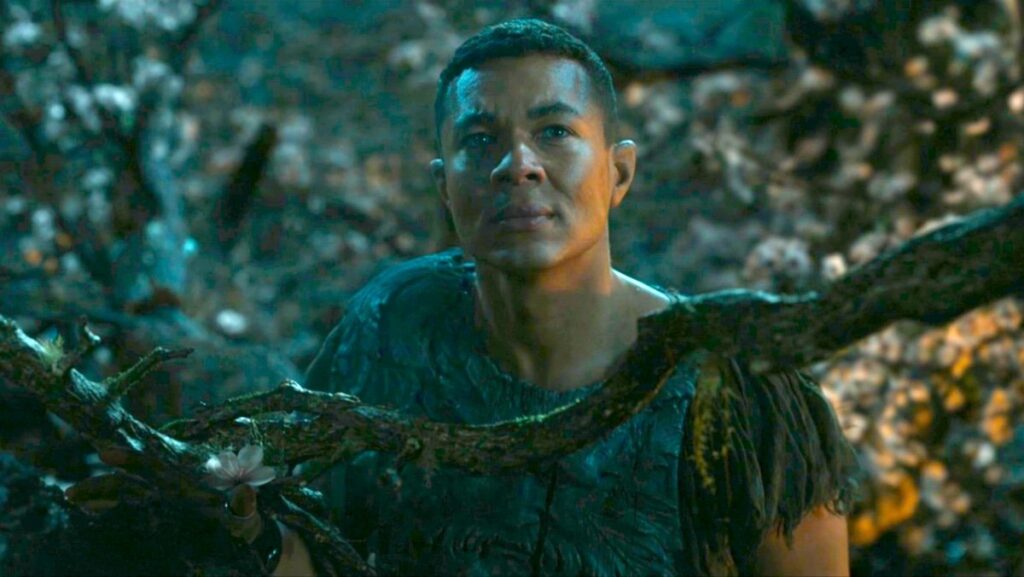On The Rings of Power, Ismael Cruz Córdova plays Arondir, the most elven elf of them all. Through Arondir, we meet a whole new kind of elf, one full of rich complexities and new perspectives. And Cruz Córdova, who has long desired to play one of Tolkien’s mythical beings, brings this role to life with absolute perfection. In season two of The Rings of Power, Arondir’s journey takes a turn into grief when he loses his great love, Bronwyn. For Cruz Córdova, this journey hits intensely close to home, creating “a difficult but beautiful experience” that, indeed, many of us sadly share. But as we walk with Arondir in season two, his story becomes one of the most resonant and human tales that The Rings of Power has to offer its fans.
Ahead of The Rings of Power season two, Ismael Cruz Córdova sat down with Nerdist to discuss Arondir’s unique perspectives, how the elf contends with grief and darkness, his relationships with humans and other elves, and how nature and nurture conspired (much to our joy) to help him become The Rings of Power‘s Arondir.
Nerdist: In many ways, Arondir is one of the true MVPs of The Rings of Power. He’s soft but strong. He has a keen sense of what’s right, and yet he has an empathy for everyone around him. Where do you think that compassion comes from for Arondir, and what is it like balancing all the layers of the character?
Cruz Córdova: I think, in life, when you are someone that is perhaps at the bottom of things, at the bottom of the pyramid, you tend to have nowhere else to look back up. And so I think that kind of being gets a more global sense of things and is able to hold more complexity and often is able to hold more empathy as well as resentment for the things that are happening. You can understand things, but also you can resent others. And I think that balancing creates a very rich being.
And I think so far, we’ve seen elves that are regal or have high political positions, positions of power, more “blessed,” more comfortable. We haven’t seen this perspective before, which to me is very; I think that’s why he sees humans as closer than perhaps other elves see them. And this fascination for them and this respect for them and trying to understand his own emotions and how is it to balance that? I think to balance that is just how we balance our every day. The complexity of emotions that you may have in a day, I’m sure that I have in a day. It’s very similar to what this guy is going through.
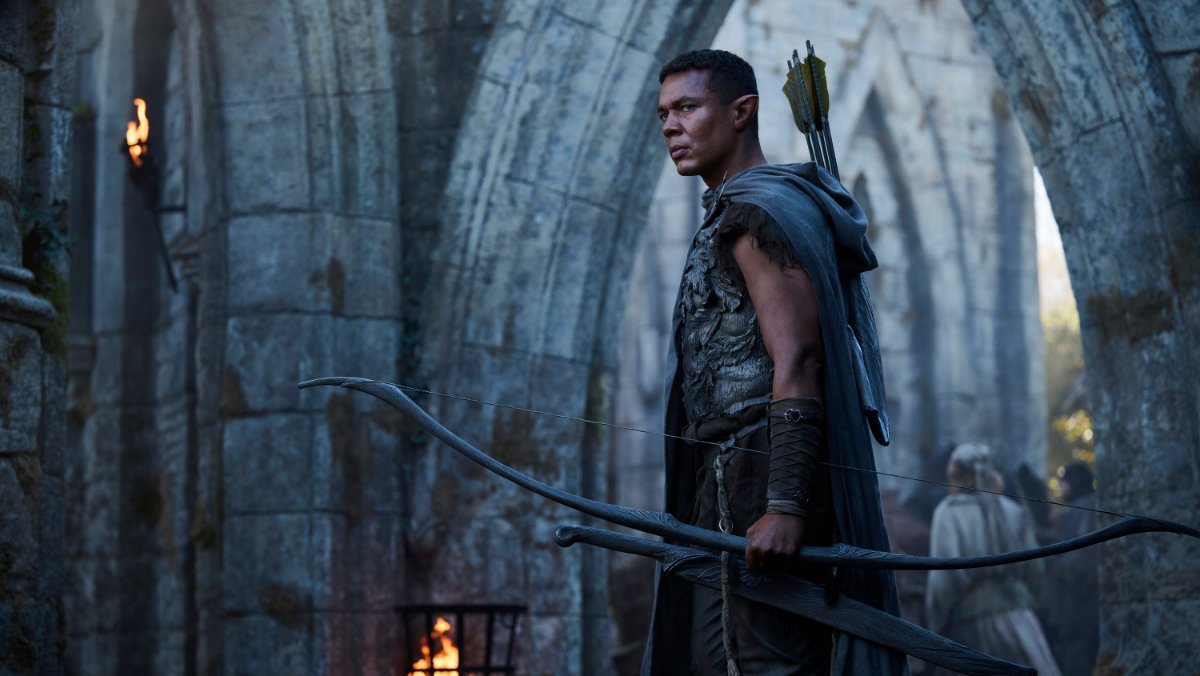
In season one, encountering darkness actually pushes Arondir to evolve in certain ways and take charge of himself and those around him. But as the darkness continues to grow, do you think it pushes him to thrive and take on these leadership roles? Or does it entangle him in its grasp?
Cruz Córdova: I think there’s a little bit of both. I think he steps up when it’s needed. That’s something that we know about him. He will step up. But, of course, this grief and this darkness… I know it first-hand, and it can entangle, and it really does make you question just about everything.
I’ve experienced great loss in my life, and it’s defined my character, and it’s defined my journey through my twenties and thirties. I lost my sister when I was 20 years old, and it’s definitely a great force to try to survive. It’s something that you really have to push against and survive from, and it completely changes your perspective on things. But you’re called upon to do other things as well. I was called upon to continue my journey, to keep my dreams, to finish college, to do right by that wonderful, wonderful best friend of mine. And I think that in answer to, “What did you draw upon?” I didn’t have to move that much.
I have this little tattoo in honor of my sister, so I only had to look at that. I actually got it right before the season. And I have that hand wrap [that Arondir wears], funny thing is that I was like, let me get it right there [on the forearm] because you won’t be able to see it. But when we went to the season, and I put the hand wrap on, it ended right before!
But it was beautiful, still, too. I could see it and connect with her. My own experience was informing this character. And it was a beautiful, difficult but beautiful, experience to have to bring that to the screen and bring that reality that many of us have had to experience. This reality that is so hard to talk about, but I think people can feel it more when they see it.
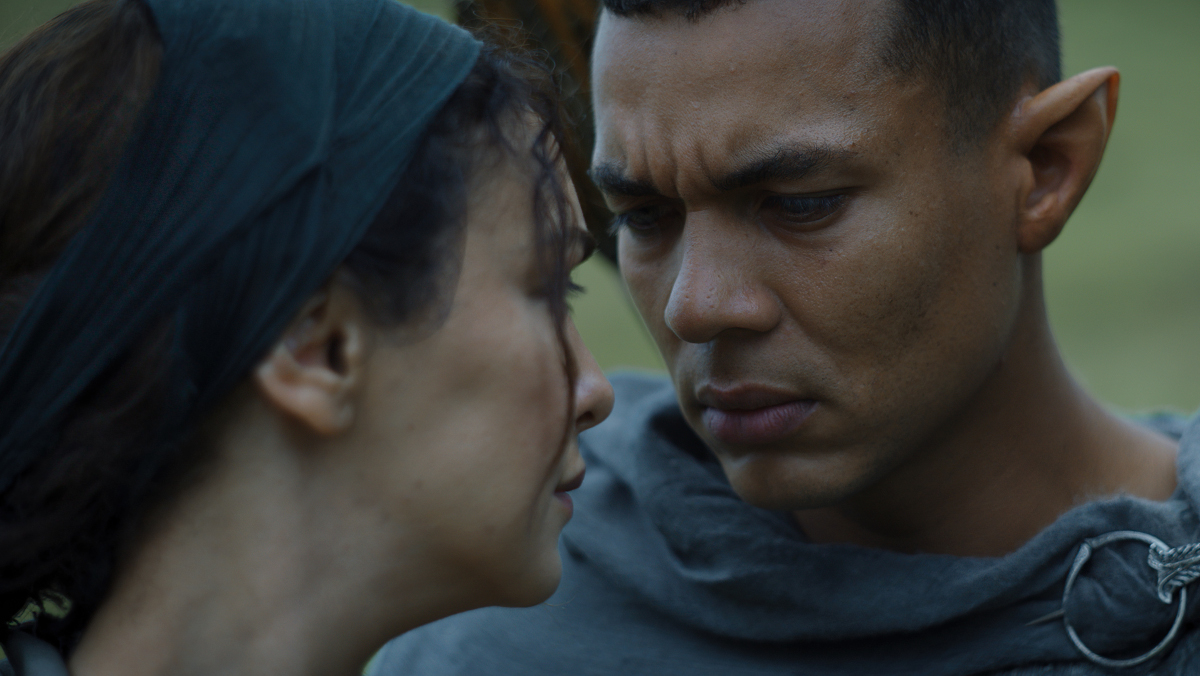
Absolutely, and, as you’re mentioning, Arondir does suffer the great loss of Bronwyn this season. How do you think that changes him and shift his motivations?
Cruz Córdova: I mean, it does both. It poses existential questions. It brings about new responsibilities because now Theo is very, very strongly his responsibility, and he promised Bronwyn that he would keep him safe.
So there’s this motivation to be a father, this is motivation to be a leader, but it’s very hard to fight against that loss. So there’s also, I feel that it definitely awakens other darker motivations, motivation for vengeance and motivation for maybe some recklessness as well. Because you’re like, “Why am I here? What is this experience of living? Is this it?” So I think it definitely awakens a set of very important new aspects of him that can definitely take him left or right.
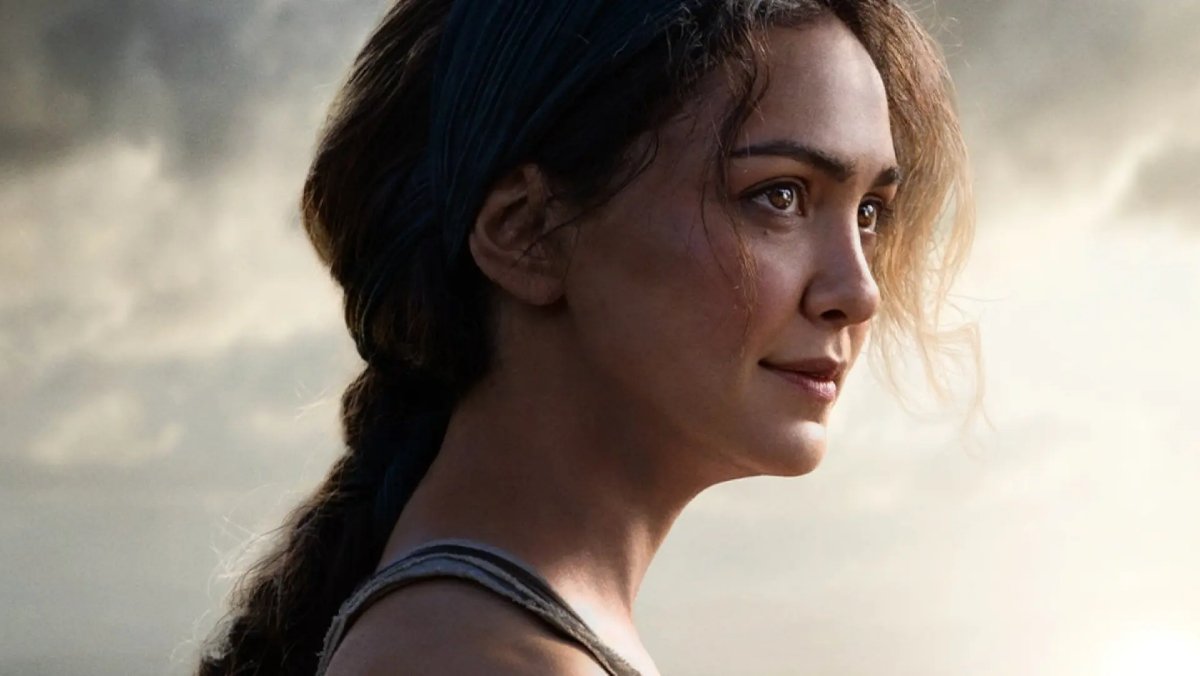
In season one of the most compelling scenes to me was between Arondir and Adar. And I love that of all the characters, only Adrondir seemed to acknowledge Adar’s elven roots and their shared origins and the tragedy of him. Could you discuss their relationship a little bit more and how Arondir views it?
Cruz Córdova: We talked earlier about empathy when you’re coming from a lower aspect of things. In that place, things are not black and white. There’s a lot of gray. And you recognize that there’s darkness as much as light in everyone. That everyone has a story. That often there’s a hair between a hero and a villain. That often villains, perhaps, are almost more noble than heroes in their pursuit of things. In their reality, they carry a sense of nobility. And Arondir sees that in Adar. He sees his relationship with his orcs, his children, as he calls them, and they call him Adar, they call him father. And so it begs the question, who is the villain?
Arondir is extremely curious. So it’s like: How did this man get here? How did this happen? Adar said, “You’ve been told many lies,” and that really awakened something in Arondir that I think carries through to the season. It’s like, “What does he feel about it all really?” And now, with this loss, is it going to spark danger in him? Where is he going to go?
Do you think we’ll see Adar and Arondir interact more this season? And does that nascent empathy he feels for Adar survive the explosion of Mount Doom and Bronwyn’s death?
Cruz Córdova: I can’t tell you much about their interaction. You’ll have to watch and see. I think that certain events complicate that empathy and I think it definitely has an impact on him that we see play out later in the season.
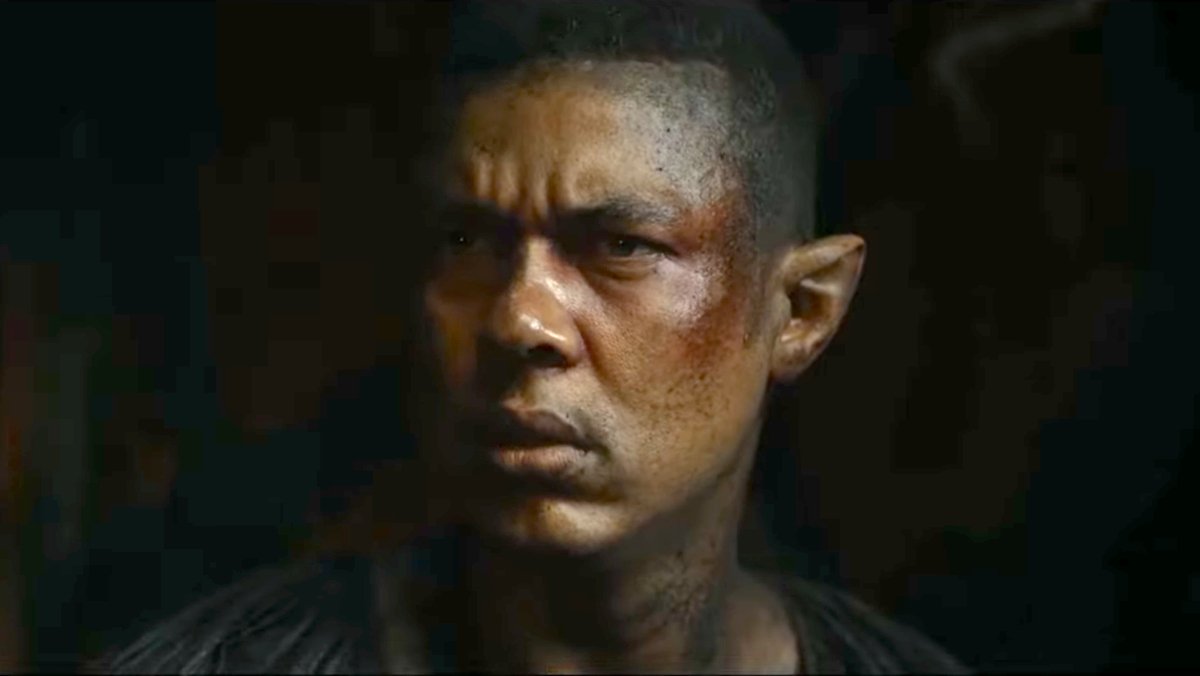
In broad strokes, what do you think the main themes of Arondir’s storyline are this season?
Cruz Córdova: It’s pushing through. It’s battling sadness and pain, grief and duty. It’s putting one foot in front of the other. It’s reminding yourself of who you are, trying to dig deep to stay true to your beliefs while opening yourself up for different knowledge and different people. Though my pairing with Isildur, for example, that forces me to interact through grief, but also with an unlikely guy, this slow human, speed-wise. He’s like, “I don’t do fast,” and it’s like I have to drag this human around. So yeah, I mean, I think he’s trying to make it.
That’s all we can do! Speaking of his relationship with Isildur, how would you describe the duo’s dynamic and how it evolves?
Cruz Córdova: It is so improbable, but it happens, and it’s good, and it’s so unpredictable, and it’s refreshing. But it’s also mutual discovery, mutual respect. I think there’s a part of Arondir that is both equally curious about Isildur and equally annoyed, in some moments. He’s skeptical of Estrid as well. I’m equally, again, equally as admiring of humans as I am skeptical of them. I can see what they can do as well and what their motivations are.
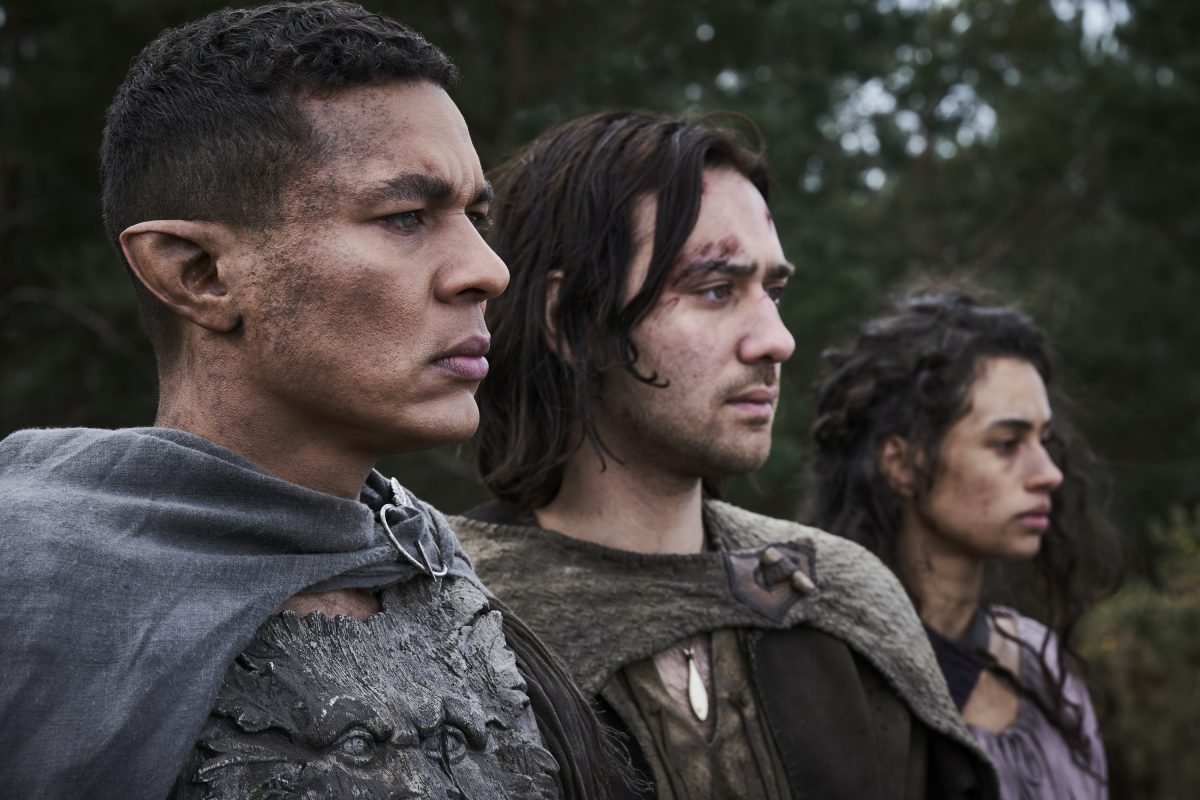
And were there any parts of Tolkien’s lore that you were especially excited to see come to life this season?
Cruz Córdova: Oh, absolutely. Absolutely. And that I can’t really tell you. But I read the script, and I definitely think that there are many, many moments that are sprinkled through the season that the fans are going to be so excited about. They are just cool, great moments. I have a couple of those. One specifically that I’m very much looking forward to seeing on the screen and sharing with the fans.
And then, just to finish off, you’ve spoken before that you had a long-time desire to be an elf. What drew you to the elves? And now that you are an elf, what has your perspective on elves changed at all?
Cruz Córdova: Yes, I had a very long-standing desire to be an elf. And what drew me to be an elf is… I don’t know, nature or nurture, I can’t tell, it’s chicken or the egg kind of thing. I grew up in the mountains in Puerto Rico, very rural. I was very contemplative. I didn’t really have a lot of friends, and I was a little bullied in school, a little… I was quite bullied in school. But also my environment growing up poor, and we didn’t have a TV, and, so I spent a lot of time just outside and by myself. I was sketching, and playing with flowers, and making ink out of flowers, and climbing trees. And one of my best friends was a mango tree that I loved, absolutely loved. I would climb it every afternoon and do my homework there after school.
And once I got my hands on The Lord of the Rings and the movies, it felt so familiar. The elves felt so familiar to me, with the reverence that they have for nature, and the whimsy and the contemplation. I would look at the clouds and just try to figure out “What is that?” I was mesmerized by everything: these giants, and the sun, and the soil, and I still am. I respect and revere it.
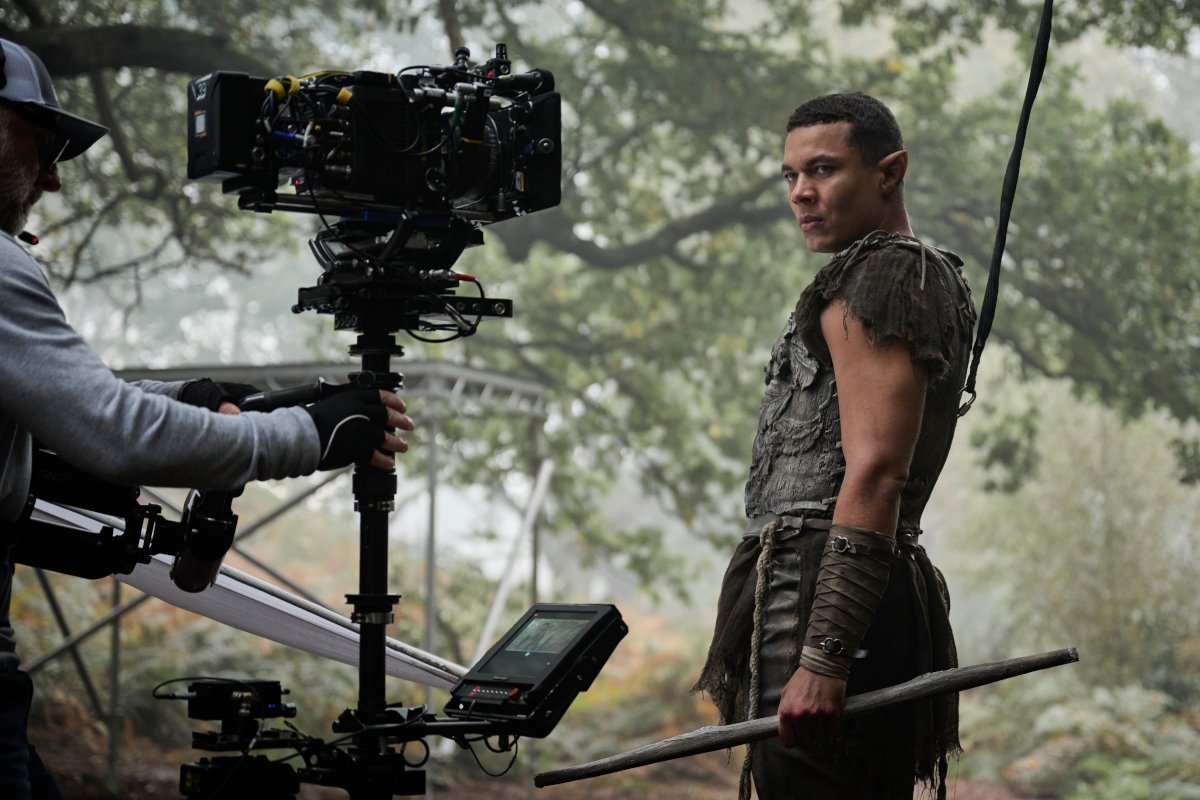
So yeah, that’s what drew me to want to be one. And after playing one, has my opinion changed? No, I think they’re great. I still think they’re great. I still think they’re just magical and badass. But I love to see the more questionable aspects of them that The Rings of Power is bringing. You are like, “Hmm, you’re not the elves that I thought you were.” The decisions that you’re making, some rash decisions, some money inequality. You see that they have a hierarchy that includes just like drafted soldiers essentially. I’m from Beleriand and I was a grower and how do I end up in the military? Was I drafted? Was I taken away? Is this forcible? Do just lower, lesser elves get the appointed in these position.
I like that it’s complicating it for us and showing different heroes that are not just the regal royal elves.

